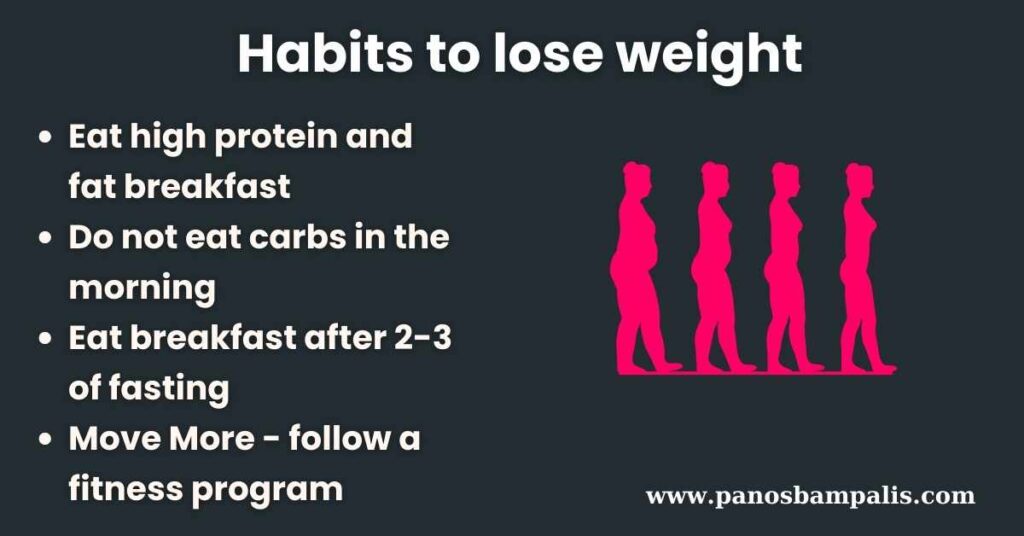Editorial Note: We may earn a commission when you visit links on my website. This does not affect Panos’ evaluations
Losing weight can feel like an uphill battle. With tempting foods everywhere and busy schedules making exercise difficult to fit in, it’s no wonder so many people struggle to reach their goal weight.
But what if small, simple habit changes could set you on the path to weight loss success?
Emerging research shows that tiny adjustments to your daily routine can have an outsized impact when it comes to shedding pounds. And unlike extreme diets or intense workout plans, these sustainable habits are far easier to turn into lifelong wins.
TL;DR

- Eat high protein and fat breakfast
- Do not eat carbs in the morning
- Eat breakfast after 2-3 of fasting
- Move More – follow a fitness program
The key is choosing healthy choices that support both diet and exercise.
This article will walk through 14 up-and-coming daily habits for weight loss that you can start adopting today, from easy food swaps to small fits of activity.
These bite-sized changes have helped me and many of my clients to lose weight. They can compound and become the breakthrough your weight loss journey needs!
One study by the National Academy of Science says explicitly: that the use of behavior and lifestyle modification in weight management is based on a body of evidence that people become or remain overweight as the result of modifiable habits or behaviors and that by changing those behaviors, weight can be lost and the loss can be maintained.
What are the healthy habits for weight loss
1. Eat high-fat breakfast
First thing in the morning, your body is in a “fasting” state. During this time, your body looks to use stored energy (fat) as its primary source of fuel.
If you eat a high-carbohydrate breakfast, your body will use that as its primary source of fuel and will store less fat as it is a slower source of fuel. If you eat a high-fat breakfast, your body will use that as its primary source of fuel and will store more fat as it is a slower source of fuel.
This is the first example of how a seemingly small change, like altering your breakfast habits, can have a big impact on your overall weight loss results.
2. Eat high protein breakfast
Another important aspect of breakfast is the amount of protein you consume. Protein is proven to help reduce your cravings for fatty and sugary foods later in the day.
Protein also helps keep your fullness longer, so you’re less likely to snack on unhealthy foods between meals.
3. Do not eat carbs in the morning

I am pretty sure that you have not heard something like that and that is indeed one of the unusual, yet efficient, habits for weight loss.
While carbs are an essential part of a balanced diet, it is best to avoid consuming carbohydrates in the morning. Your body is most efficient at metabolizing carbohydrates when your blood sugar is already high, so eating carbohydrates for breakfast would spike your blood sugar levels and make you hungrier later in the day.
High-carbohydrate breakfasts, such as cereal, whole grains, and toast, will make your body store more fat because your body is less efficient at metabolizing carbohydrates first thing in the morning.
4. Do not follow these eating habits: “Eat Breakfast Like a King, Lunch Like a Prince, and Dinner Like a Pauper”
A lot of people have heard this story and believe that it’s true, but it’s misleading.
It does make sense to eat more at dinner than at lunch since you’re likely to be more active in the evenings, but the amount of food you eat at each meal shouldn’t be based on this story – it should be based on what you need to sustain your energy throughout the day.
What works for one person might not work for another. What might be the right amount of food for one person might be too much or too little for someone else. It all depends on your current diet and your needs at that specific time in your life.
So don’t let this story dictate what or how much you eat for the day.
5. Drink more water
Water is essential for good health, but many people don’t drink enough of it. If you’re interested in losing some weight, you might want to consider increasing your daily water intake.
People who drank water before their meals lost more weight than those who didn’t drink water, according to one research study. The reasons behind this are unclear, but there are a few theories.
Water may assist you to feel fuller throughout the day, which might lead to you consuming less. It could also aid in the increase of your metabolism since your body heats the water with energy.
Generally, you should aim to drink half your body weight in ounces each day. For example, if you weigh 150 pounds, you should drink 75 ounces of water each day.

6. Increase your Physical Activity
You don’t have to go to the gym or be a fitness expert to be considered an active person. All it takes is a few simple steps each day, such as walking up the stairs instead of taking the elevator or parking further away from your destination so you can walk a bit more.
Whether you’re looking to lose weight or just lead a healthier lifestyle, adding more movement to your day can help reach your goals.
When you’re more active throughout the day, your metabolism is working overtime, which can help you lose weight.
7. Limit High-Glycemic Carbohydrate Foods
Certain carbohydrate-rich foods, commonly referred to as “high-glycemic foods,” are digested very quickly in your body and can cause a spike in your blood sugar levels.
These high-glycemic foods can cause spikes in your insulin levels and could increase the amount of fat in your body. Studies also show that people who eat more high-glycemic foods are at a higher risk of developing type 2 diabetes.
8. Be mindful of what you eat and how much you eat
It’s easy to eat more than you think, especially if you’re not paying attention to what you’re putting in your mouth. Studies have shown that people eat about 15% more food when they don’t pay attention to what they’re eating.

You may not want to eat like a bird, but you do need to pay attention to what you’re eating. Focus on enjoying your food, and savor every bite. You need to be mindful of what you’re eating and avoid emotional eating.
You should eat three regular meals a day and three snacks a day. If you’re hungry between meals, eat something healthy and nutritious. But don’t starve yourself, since this can actually slow down your metabolism.
9. Commit to a fitness program
This might seem like an obvious one, but it’s something many people fail to do.
If you want to lose weight, you can’t just hope that it happens. You have to put in the work! There are plenty of different fitness programs available, and you can find something that works for you.
Some people prefer to go to a gym, while others like to exercise outdoors. There are also tons of different fitness programs to choose from, including yoga, Pilates, and Zumba. You can also choose to do things like walk or hike more often mountain bike, or volunteer at a local garden.
The more active you are, the more calories you’ll burn, and the more weight you’ll lose.
10. Don’t rely on miracle foods or supplements to lose weight
Tons of “miracle” foods out there that will supposedly help you lose weight. Unfortunately, no one food can help you lose weight.
And even if it did, it wouldn’t be a lasting weight loss.
Don’t rely on a specific food or supplement to help you lose weight.
Instead, focus on creating a healthier lifestyle that includes plenty of nutritious foods and regular exercise.
11. Eating protein in every meal
Protein is an important nutrient that offers many health benefits.
It is essential for building and repairing tissues, producing enzymes and hormones, and boosting immunity. Protein can also help you lose weight and keep it off. Eating protein-rich foods (meat, eggs, greek yogurt) slows down the digestive process and positively impacts your hunger hormones, making you feel fuller for longer.
As a result, you are less likely to snack between meals or overeat at your next meal. What’s more, protein helps to preserve muscle mass during weight loss, making it an essential part of any healthy eating plan.
12. Get enough sleep
Sleep is an important part of our daily routine. It allows our bodies to rest and recover from the day’s activities. Not getting enough sleep can have many negative consequences, one of which is weight gain.
Lack of sleep increases the hunger hormone, ghrelin, and decreases the satiety hormone, leptin. This hormonal imbalance can lead to increased appetite and cravings for high-calorie foods. In addition, sleep deprivation makes us less likely to make healthy food choices and more likely to indulge in unhealthy snacks.
To avoid these issues, it is important to get into the habit of sleeping seven to eight hours a night. By getting enough rest, we can help to control our hunger hormones and make better food choices. In turn, this can help us to maintain a healthy weight.

13. Prepare your food to lose weight
When you are hungry, the last thing you want to worry about is what to eat. If you don’t have any food or supplies on hand, you may be tempted to eat something unhealthy just to tide yourself over until you can get to a grocery store.
This can lead to problems like weight gain, indigestion, and even nutrient deficiencies. To avoid this, it is important to always have some healthy snacks and meals available. This way, you can satisfy your hunger without having to resort to unhealthy eating options.
There are many easy and convenient ways to do this, such as keeping a food journal or packing a lunch before heading out for the day. By taking a little time to prepare, you can make sure that you always have something healthy to eat when hunger strikes.
14. Enjoy the Food You Eat
Losing weight and keeping it off can be a challenge, but it is important to remember that the food you eat plays a big role in your success.
It is important to enjoy the food you eat and re-establish your relationship with food.
When you are trying to lose weight, it is important to enjoy the food you eat and re-establish your relationship with food.
Cooking the food the way you like it is a great way to do this. Not only will you be more likely to stick with your diet if you enjoy the food, but you will also be more likely to reach your goals.
There are a lot of great recipes out there that can help you lose weight and keep it off. Find one that fits your taste and start cooking!
Summing Up
There you have it:
14 unusual habits for weight loss that will help you reach your ultimate weight loss goals.
With these tips in mind, you’ll be well on your way to a healthier, happier you. Remember, consistency is key, so try to incorporate these habits into your daily routine and stick with them for the best results.
Good luck on your weight loss journey!
Do you have more questions?
1. What are the best habits for weight loss?
Habits for weight loss can include making healthy food choices, managing portion sizes, and incorporating regular physical activity into your daily routine.
2. How can eating habits help boost weight loss?
Positive eating habits such as consuming whole grains, healthy fats, and lean proteins can aid in weight loss and contribute to sustainable weight loss in the long run.
3. What are the key habits that will help with weight loss?
Adopting habits to lose weight like mindful eating, keeping a food journal, and eating well-balanced meals can support weight loss efforts and contribute to lasting weight loss.
4. What is the 21 90 rule for weight loss?
The 21 90 rule for weight loss is a concept that suggests it takes 21 days to create a habit and 90 days to solidify it, making it a part of your lifestyle.
This means that if you can maintain a new behavior for 21 days, it is more likely to become a lasting part of your routine. By continuing the behavior for 90 days, it is more likely to become a permanent habit that contributes to lasting weight loss.
5. How does the 21 90 rule help you lose weight?
The 21 90 rule for weight loss emphasizes the development of healthy habits throughout the day. By committing to healthy eating habits consistently for 21 days and then 90 days, it can lead to lasting weight loss. This consistency aids in boosting weight loss and helps individuals stay on track with weight loss goals.

